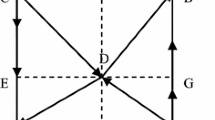Abstract
Personalized products and services in e-commerce bring consumers many new experiences, but also trigger a series of information security issues. Considering the bounded rationality of the game participants, in this paper, we propose an evolutionary game model of privacy protection between firms and consumers based on e-commerce personalization. Evolutionary stable strategies (ESSs) are obtained from the equilibrium points according to the model analysis, and then simulation experiments are launched to validate the decision-making results and the influencing mechanism of various factors. The results show that the model can eventually evolve toward a win-win situation by wisely varying its various factors, such as ratios of initial strategies, cost of privacy protection, commodity prices, and other related factors. Further, we find that reducing the possibility of the privacy breach under the premise of privacy protection can help promote the e-commerce personalization.
Similar content being viewed by others
References
Lee D J, Ahn J H, Bang Y. Managing consumer privacy concerns in personalization: a strategic analysis of privacy protection [J]. MIS Quarterly, 2011, 35(2): 423–444.
Montgomery A L, Smith M D. Prospects for Personalization on the Internet [J]. Journal of Interactive Marketing, 2009, 23(2): 130–137.
Awad N F, Krishnan M S. The personalization privacy paradox: An empirical evaluation of information transparency and the willingness to be profiled online for personalization[J]. MIS Quarterly, 2006, 30(1):13–28.
Culnan M J, Armstrong P K. Information privacy concerns, procedural fairness, and impersonal trust: An empirical investigation[J]. Organization Science, 1999, 10(1): 104–115.
Acquisti A, Brandimarte L, Loewenstein G. Privacy and human behavior in the age of information[J]. Science, 2015, 347(6221): 509–514.
Ishikawa S, Kuwamoto H, Ozawa S. The value of privacy assurance: An exploratory field experiment[J]. MIS Quarterly, 2007, 31(1):19–33.
Cadogan R A. The ethics of data privacy in an electronic marketplace: The incorporation of fair information practice principles into privacy policies[J]. Review of Business Information Systems, 2011, 7(1):23.
Tang Z, Smith M D. Gaining trust through online privacy protection: Self-regulation, mandatory standards, or caveat emptor[J]. Social Science Electronic Publishing, 2008, 24(4): 153–173.
Kantarcioglu M, Bensoussan A, Hoe S R. When do firms invest in privacy-preserving technologies?[C] // GameSec 2010: Decision and Game Theory for Security. Berlin: Springer-Verlag, 2010:72–86.
Naldi M, Flamini M, D’Acquisto G. Information security investments: When being idle equals negligence [C] // GECON 2013: The 10th International Conference on Economics of Grids, Clouds, Systems, and Services. Berlin: Springer-Verlag, 2013: 268–279.
Gu W J. Analysis of network privacy protection technology in the electronic commerce market based on the game theory model[J]. Journal of Shandong Agricultural University, 2014, 45(4): 595–600(Ch).
Friedman D. Evolutionary games in economics[J]. Econometrica: Journal of the Econometric Society, 1991, 59(3): 637–666.
Syam N B, Ruan R, Hess J D. Customized products: A competitive analysis[J]. Marketing Science, 2005, 24(4): 569–584.
Acquisti A, Taylor C R, Wagman L. The economics of privacy[J]. SSRN Electronic Journal, 2016, 54(13): 442–492.
Wu Y, Feng G, Wang N, et al. Game of information security investment: Impact of attack types and network vulnerability[J]. Expert Systems with Applications, 2015, 42(15): 6132–6146.
Schatz D, Bashroush R. Economic valuation for information security investment: a systematic literature review[J]. Information Systems Frontiers, 2017, 19(5): 1205–1228.
Draper N A. From privacy pragmatist to privacy resigned: Challenging narratives of rational choice in digital privacy debates[J]. Policy & Internet, 2017, 9(2): 232–251.
Lin Y C, Chen C Y, Chang Y Y. Marketing customized products: A discussion on the preference of color combinations [C] // Proceedings of PICMET’ 14 Conference: Portland International Center for Management of Engineering and Technology; Infrastructure and Service Integration. Piscataway: IEEE, 2014: 3168–3178.
Gordon L A, Loeb M P. The economics of information security investment[J]. ACM Transactions on Information & System Security, 2002, 5(4):438–457.
Wu Y, Feng G, Wang N, et al. Game of information security investment: Impact of attack types and network vulnerability[J]. Expert Systems with Applications, 2015, 42(15-16): 6132–6146.
Gamage T T, McMillin B M, Roth T P. Enforcing information flow security properties in cyber-physical systems: A generalized framework based on compensation[C] // 2010 IEEE 34th Annual Computer Software and Applications Conference Workshops. Piscataway: IEEE, 2010: 158–163.
Fielder A, Panaousis E, Malacaria P, et al. Decision support approaches for cyber security investment[J]. Decision Support Systems, 2016, 86(C): 13–23.
Cressman R. Evolutionary Dynamics and Extensive Form Games [M]. Cambridge: MIT Press, 2003.
Spiekermann S, Acquisti A, Böhme R, et al. The challenges of personal data markets and privacy[J]. Electronic Markets, 2015, 25(2):161–167.
Author information
Authors and Affiliations
Corresponding author
Additional information
Foundation item: Supported by the National Natural Science Foundation of China (71571082, 71471073), and the Fundamental Research Funds for the Central Universities (CCNU14Z02016, CCNU15A02046)
Biography: LI Yanhui, male, Professor, Ph.D., research direction: information security and game theory.
Rights and permissions
About this article
Cite this article
Li, Y., Xu, L. & Liu, B. Evolutionary game analysis on e-commerce personalization and privacy protection. Wuhan Univ. J. Nat. Sci. 23, 17–24 (2018). https://doi.org/10.1007/s11859-018-1289-y
Received:
Published:
Issue Date:
DOI: https://doi.org/10.1007/s11859-018-1289-y




